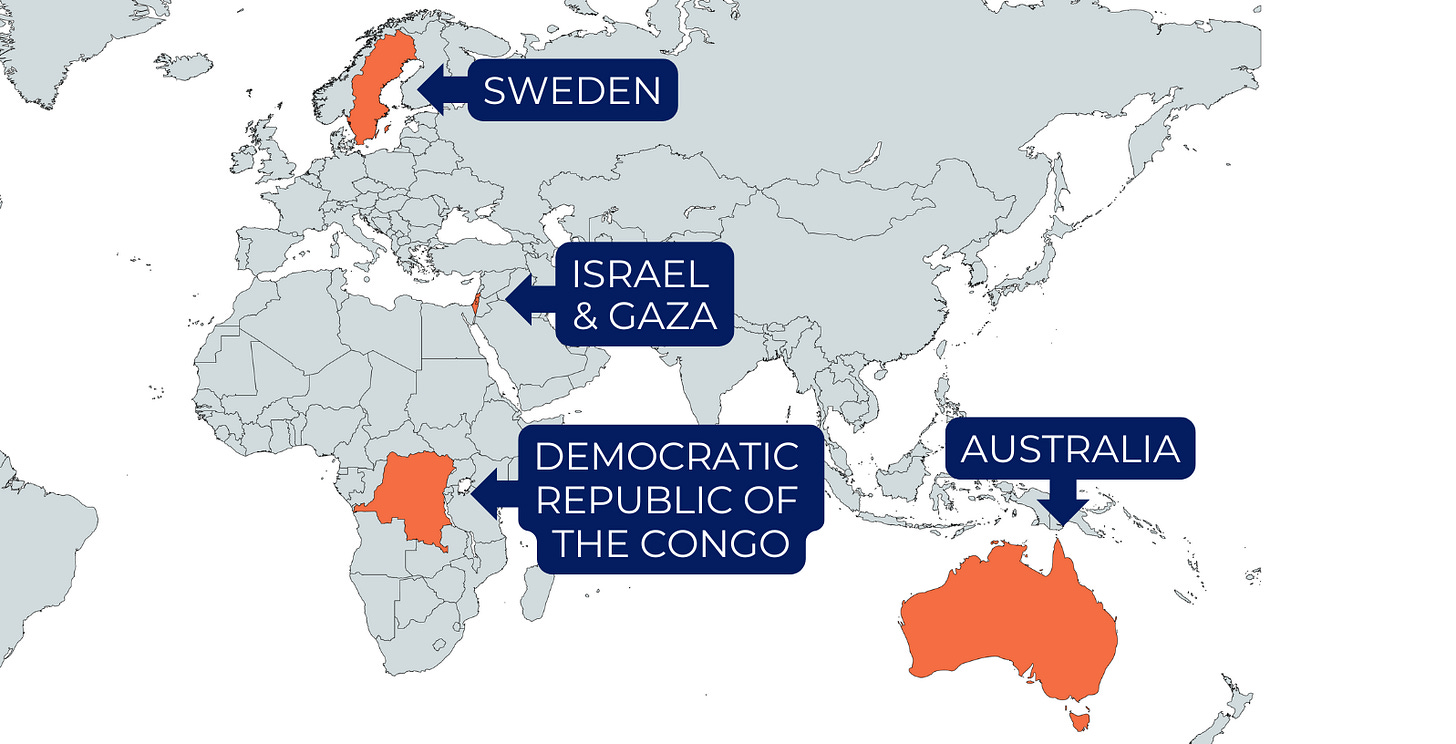🔎 What you need to know about tariffs (and Trump's other big moves and setbacks)
Also: Crisis worsens in DR Congo, jail for Nazi salutes in Australia, and a guide to the Dept. of Education
This newsletter is sponsored by SideShift - your go-to app for finding part-time gigs as a Gen-Zer.
Tariffs, explained
President Trump’s 10% tariff on all goods imported from China to the U.S. went into effect on Tuesday. This led China to hit back, announcing its own set of tariffs on certain products imported into China from the US. Planned tariffs on goods from Mexico and Canada are paused until March 4, but could be imposed after that.
But according to a December Ipsos poll, only 45% of Americans know how tariffs work (65% of Democrats and 35% of Republicans). If you’re unclear about the specifics of tariffs — don’t fret. We’ve got you covered. Here’s what you need to know:
What is a tariff
A tariff is a form of taxation on goods imported from other countries, typically determined and charged as a certain percentage of a product’s value. Under the 10% tariffs on Chinese goods, a product from China worth $100 is subject to a tax of $10.
Who pays for it?
The U.S. businesses who import the products pay the tariffs on their imported goods to the U.S. government. As a result, this often results in the business raising the price of the product to offset the tariff.
So what’s the impact on me?
Because the tariff often results in more expensive products, you often end up paying more for the goods.
The U.S. imports a lot of goods from China, from phones, sneakers, clothing, toys, electronics, and even ingredients in generic drugs. Many businesses will raise prices of these goods, but others may decide to eat the costs of the tariffs.
If the Mexico and Canada tariffs go into effect, this could impact the prices of fresh produce, cars, and construction materials.
Why is everyone so confused about tariffs?
There’s a lot of mixed messaging. On the campaign trail, Trump said that “it’s not going to be a cost to you, it’s going to be a cost to another country.” Economics almost universally regarded this as misleading.
Why is Trump obsessed with Tariffs?
These tariffs are part of his America First agenda—the idea being that these tariffs would shield American manufacturing jobs from foreign competition. They also provide a stream of revenue alternative to income tax, much like the pre-Civil War era.
Trump actually threatened a 60% tariff on China during this campaign, so what went into effect is considerably smaller.
Has he done this before?
Trump imposed new tariffs his first term, and it did have an impact. Investopedia reports that a 2018 tariffs against foreign washing machines caused the price of washers and dryers to increase 9% more than inflation. The U.S. did gain some manufacturing jobs as U.S. factories ramped up appliance productions, but for each new job, consumers paid $820,000 in inflated appliance costs.
🗳️ Politics
➤ Donald Trump imposes sanctions on International Criminal Court, claiming it ‘undermines the critical national security’ of US and allies such as Israel (Financial Times)
➤ Trump administration to lay off nearly all of U.S. Aid agency’s staff (NYTimes)
➤ NCAA releases transgender athlete policy changes after Donald Trump signs executive order (Yahoo Sports)
➤ Judge temporarily blocks Trump plan offering incentives for federal workers to resign (AP News)
➤ Judge issues nationwide injunction blocking Trump's bid to end birthright citizenship (ABC News)
➤ Services for disabled Americans, trans youth and refugees feel the squeeze from Trump’s early actions (CNN)
🌎 Around the world
➤ Nearly 3,000 people killed after rebels seize key city in DR Congo, UN says (CNN)
↳ Related: Hundreds of women raped and burned to death after prison set on fire in the Democratic Republic of the Congo (Guardian)
➤ Israel backs Trump plan and orders military to prepare for Palestinians to leave Gaza (CNN)
➤ Mandatory jail for Nazi salutes under new Australia laws (BBC)
➤ Sweden's worst mass shooting leaves immigrant community on edge (BBC)
💰 Money
➤ Musk's DOGE gains access to Medicare, Medicaid data systems (Newsweek)
➤ Google ends diversity hiring goals—Here are all the companies rolling back DEI (Forbes)
⚕️Health and wellness
➤ Loretta Ford, who helped create the role of nurse practitioner, dies at 104 (WSJ)
➤ Marijuana dependence linked to higher risk of death (NYTimes)
Education
➤ A guide to what the U.S. Education Department does (and doesn't) do (NPR)
More about our sponsor:
SideShift launched in June 2024 by 3 UW Madison graduates. Since launching the platform they have grown to have over 10,000 jobseekers, 150 businesses, and have already facilitated over 500 hires. SideShift primarily works with remote companies looking to establish campus ambassador programs, hire content creators, or bring on social media managers. Download the app here.
🙏 Thanks for reading!
We are looking forward to hearing from you as we build our community. Reply to this email, drop us a note here, or slide into our DMs on Substack with your thoughts. And don’t forget to follow us on Instagram and TikTok for more news.








